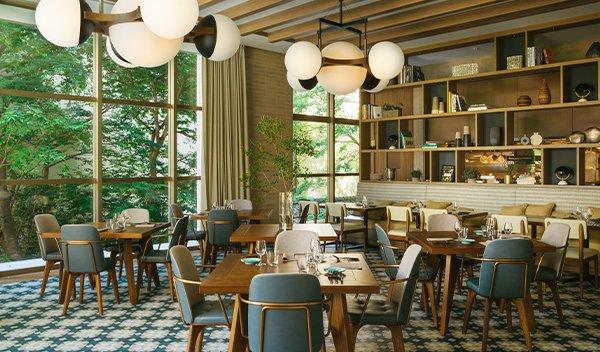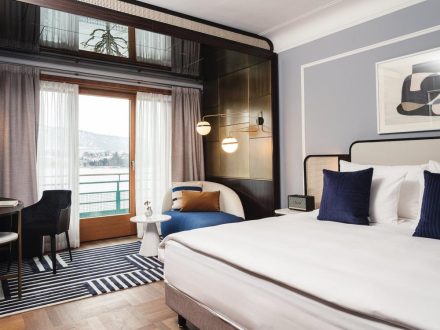
Zentis Osaka
Carved from scratch, every inch of Zentis Osaka has been built to fulfill a blueprint promise that pledged simplicity, warmth and world-class design. The conclusion is a 16-storey new build defined by Toshiken architecture office and Kajima Design’s clean lines, soaring ceilings and double height windows. At street level, the architects’ decision to set the building’s façade back from the road has allowed for additional space at the entrance, which is filled with greenery for a verdant welcome that segues into an abundance of natural materials inside. Key components such as timber and Ceppo stone sit alongside smooth brickwork and structural ironmongery in a reflection of Osaka’s urban landscape and industrial heritage, while blue limestone, fashioned into a stunning sculptural central staircase in the entrance hall, gives a taste of the luxe touches that continue throughout the property. Fed by the culture, history, climate and atmosphere of the city, British designer Tara Bernerd has conceived a series of interiors where a fresh contemporary palette coalesces with a mix of mid-century and Bernerd-designed furniture for a well-executed interpretation of this corner of Osaka.
More broadly, but still aligned with the hotel’s Japanese location, Bernerd has additionally looked towards the modular design of bento boxes for inspiration. This manifests by way of a playful use of joinery around bathroom areas, and guestroom layouts where smooth compartmentalization introduces optimum flow and functionality. Similarly, the dining area in UPSTAIRZ embraces the Japanese aptitude for space utilization and features a display case—populated with books, locally sourced pottery, objets d’art and sculptures—remastered as a space divider to create a subtle separation between the seating area and open kitchen. Elsewhere in public spaces a clean, warm aesthetic prevails, with a natural color palette of taupe, beige and gray interspersed with shots of mustard, emerald green and aquamarine, echoing the soft, warm tones of guestrooms. Grand finishing touches, like a double-sided fireplace in the lobby with a glazed surround and artwork created on traditional Japanese washi paper by local artist collective Ubushina, complete Zentis’ artful layering of a series of definitive components.
Spanning the 25-square meter Studios to the 57-square meter Suites, Zentis’ guestroom offering caters to a host of visitors to this thriving metropolis. Suite accommodations, situated on the higher floors, encompass entirely separate sleeping and living areas as well as space in which to wine and dine, while walk-in rain showers and tubs—also featured in Corner Studios—complete the emphasis on space, rest and relaxation. Studio accommodations are similarly intuitive in functionality, with separate seating areas and carved out niches for storage, entertainment and amenities. The architects’ success in securing a minimum four-meter width for all guestrooms has gifted the hotel with an inventory of spaces that are larger than average for the city, though guests wishing to further amplify capacity have the option to connect Studios with Suites for even more room. Uniting all the accommodations are a series of flourishes that once again pay homage to the hotel’s Japanese heritage. These include exaggerated brushstroke artwork inspired by Japanese calligraphy and created by artist Masami Ehara, which feature prominently above each bed and imbue every space with a dose of local culture. Rounding out all guestrooms are 4K televisions equipped with Apple TV, plush towels by Imabari and soft sleepwear, for truly sequestered stays.
For guests, locals and visitors alike UPSTAIRZ, the hotel’s second floor all-day dining venue, presents a prime draw for foodies thanks to the succulent French-meets-Japanese offerings of Chef Shinya Otsuchihashi. With a 116-seat dining area accompanied by an open kitchen, a lounge, a covered outdoor terrace, and a bar, the multifaceted outlet is defined by breakfast, lunch and dinner menus that utilize seasonal ingredients prepared with a nod to both Japanese and French cuisine. The dining room is easily distinguished from the atmospheric lounge where a rich palette, an open fireplace and layers of texture flourish for an intimate and seductive atmosphere. The two spaces are intersected by a bespoke bar, made from locally-sourced tiles, from which an extensive menu of Japanese whiskies and original cocktails are served to round out UPSTAIRZ as an exciting outing in the heart of a city renowned worldwide for its dining scene.
Location
Located within walking distance of Osaka’s Umeda area, a business and commercial hub, Zentis is well-positioned for an exploration of the city’s most prominent attractions, with a series of shops and department stores also situated nearby. Also within close proximity to the hotel is the Kita-Shinchi district, home to an abundance of restaurants offering the wide range of quality cuisine for which Osaka is famed. In addition to its array of both casual and formal dining opportunities, the area is known for its vibrant nightlife, while by day the Osaka Science Museum, the National Museum of Art, The Museum of Oriental Ceramics, and Nakanoshima Children’s Book Forest, designed and built by Tadao Ando, offer ample opportunity for cultural outings.
Design Hotels™ represents and markets a curated selection of over 330 independent hotels in more than 60 countries across the globe. More than a collection of hotels, the company is a collection of stories. Each property reflects the ideas of a visionary hotelier, an "Original", someone with a passion for genuine hospitality, cultural authenticity, thought-provoking design and architecture. Each "Original" stands for the individual, aesthetic and service-driven experience that his or her hotel provides.
In 2017, Design Hotels™ launched Further, a traveling laboratory for experiential hospitality that transforms hotels across the globe into temporal hubs of thematic exploration. The mission behind Further aligns with the values of the future-facing Promad, a new generation of traveler embracing progressive travel and global nomadism. First identified by Design Hotels™ in collaboration with leading futures consultancy The Future Laboratory, the purpose-driven, self-actualizing Promadic movement is set to shape the future of hospitality.
Founded by Claus Sendlinger in 1993, Design Hotels™ offers its members insightful travel industry knowledge, from market trend consultancy to international sales representation. The company has its headquarters in Berlin and branches in London, Los Angeles, New York and Singapore. Executive Board members are: Peter Cole (CEO) and Sascha Wolff (CFO). In 2019, Design Hotels™ joined forces with Marriott Bonvoy, enabling its member hotels to have both a greater and more selective reach while offering its Community the benefit of the industry’s leading loyalty program.
design hotels AG
Stralauer Allee 2c
10245 Berlin
Telefon: +49 (30) 884940-000
Telefax: +49 (30) 257698-96
http://www.designhotels.com
![]()





